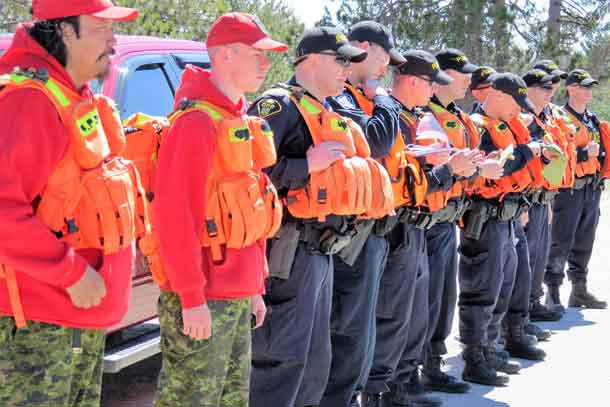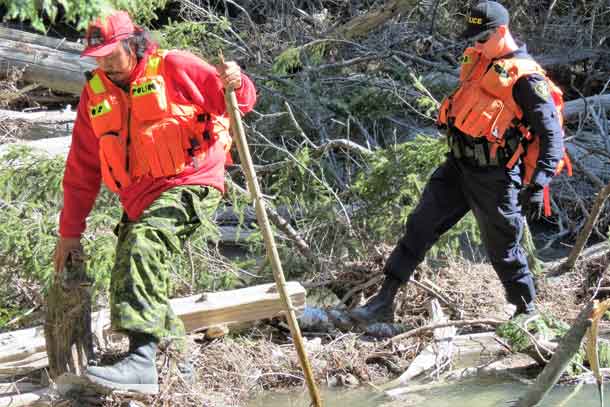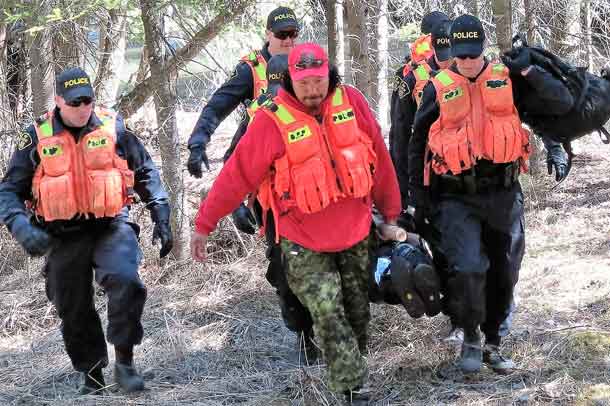

THUNDER BAY – Two students stood out among the Ontario Provincial Police officers learning search and rescue techniques and procedures during a recent OPP Emergency Response Team training course at Canadian Forces Base Borden.
That’s because Master Corporal Isaac Barkman and Ranger Christian Caie wore the distinctive red sweater and ball cap of the Canadian Rangers, the part-time reserve component of the Canadian Army that provides a military presence in remote and isolated communities across Canada’s North. In Ontario’s Far North there are 650 Rangers in 23 First Nations, 20 of which can only be reached year-round by air.
The two Rangers completed an intensive 10 days of training during which they received, along with the OPP officers, 112 hours of classroom instruction and field training exercises that often did not finish until midnight. The physical demands of the training were a surprise to both the Rangers who were impressed by the fitness of the officers.

MCpl. Barkman is an Oji-Cree from the isolated First Nation of Sachigo Lake, 635 kilometres north of Thunder Bay. Ranger Caie lives in Pickle Lake, a small town on Ontario’s most northerly section of paved highway and a member of the nearby Mishkeegogamang First Nation’s Ranger patrol.
“It was a little bit weird at first (working with the OPP), especially riding in the back of a cruiser,” said Ranger Caie. “I felt at first we were kind of separated from them, because we’re not police officers, but we were quickly part of one team and working together. We were here on the course for the same reason – we want to save lives.”

The Rangers play a key role in providing search and rescue situations in the Far North of the province, said Sergeant Jamie Stirling, the OPP’s provincial search and rescue coordinator. While the OPP has prime responsibility for search and rescue in Ontario, assembling a trained search and rescue team and getting a plane to fly them into a remote First Nation may take up to eight hours or longer depending on the weather.
“By then the Rangers have their feet on the ground and if they haven’t found the missing person they are well on their way to doing so,” Sgt. Stirling said. “They know the land where they live and they do a tremendous job.”
The OPP has been training Rangers in search and rescue for the past six years. Three or four Rangers take the 10-day search and rescue portion of the nine week ERT course every year. For each of the last two years a dozen Rangers have taken a custom designed OPP search and rescue course. A quarter of the graduates are women.
“The OPP training is a win-win for the army and everyone,” said Lieutenant-Colonel Matthew Richardson, commanding officer of the Rangers in northern Ontario. “The army gets the benefit of first rate training from the OPP, one of the best police forces in the world, and the Rangers save the lives of members of our remote communities in the Far North of Ontario. The bad weather this past Christmas and New Year created situations where we were called out a dozen times and we were able to save lives every time. All that was done before the OPP could have got a team into the communities.”
(Sergeant Peter Moon is the public affairs ranger for 3rd Canadian Ranger Patrol Group at CFB Borden.)






